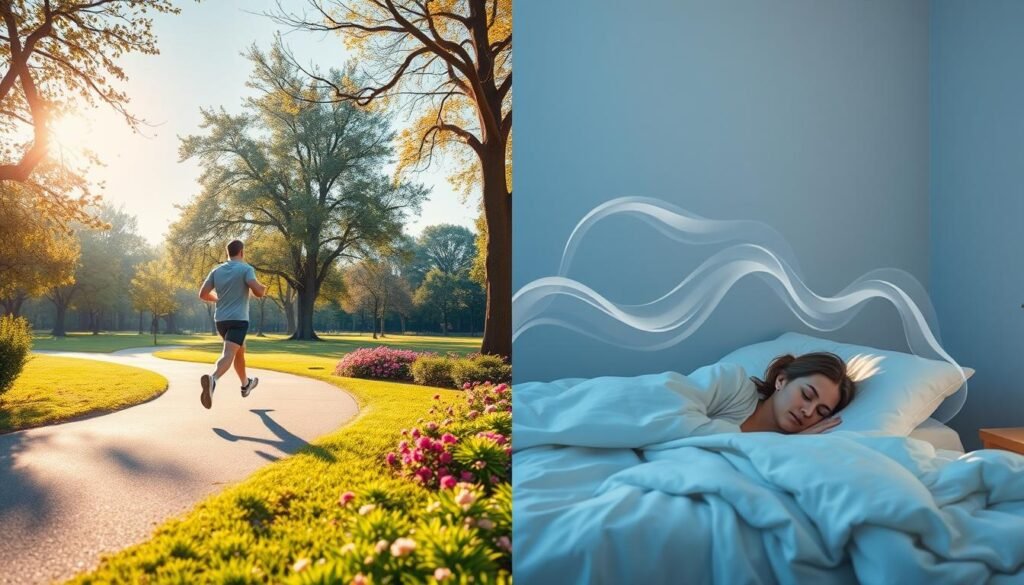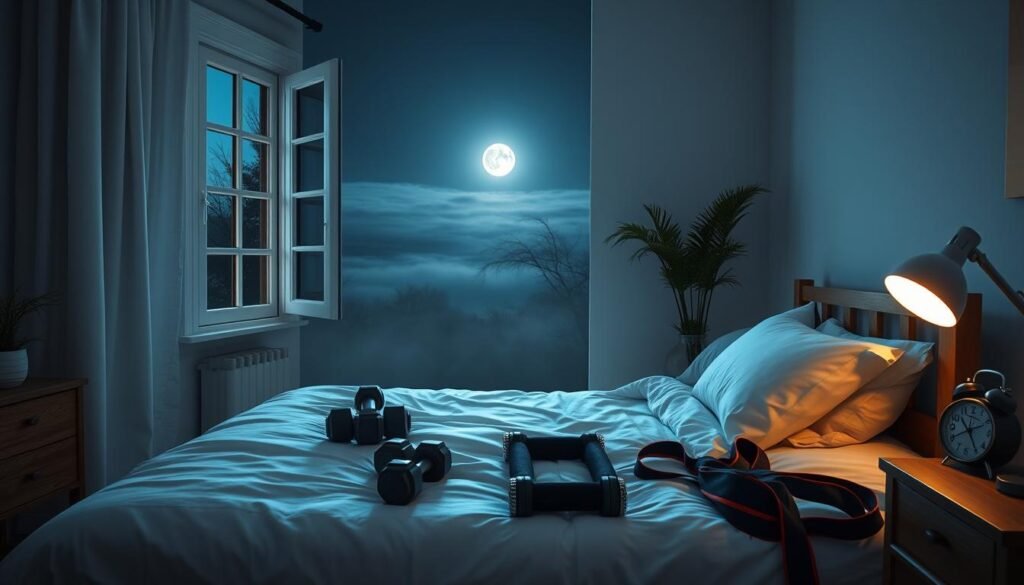Did you know that exercising can work as well as sleep meds? It boosts mood and lowers stress. This, in turn, helps you sleep better. Just 30 minutes of daily activity can make you sleep longer and more deeply.
This good sleep supports your overall health. Exercise and sleep affect each other positively. Getting fit can help you sleep better. It can make your body release more melatonin and reduce stress. This all leads to a better night’s sleep.
Exercise does more than just keep you in shape. It deeply affects your sleep too. The link between exercise and sleep shows why it’s key to be active regularly. Being active helps you fall asleep faster and deepens your sleep.
By walking briskly or doing high-intensity workouts, you can greatly improve your sleep. These activities help bring back restful nights. They make it easier for you to rest and recharge.
Key Takeaways
- Physical activity can be as effective as sleep medications for improving sleep quality.
- 30 minutes of exercise a day can enhance sleep duration and efficiency.
- Aerobic and resistance exercises positively impact sleep patterns and architecture.
- Regular exercise may reduce symptoms of insomnia and sleep apnea.
- Timing of workouts can influence sleep quality, with earlier sessions being more beneficial.
The Role of Physical Activity in Improving Sleep Quality
It’s key to know how physical activity can help sleep better for overall health. Good sleep involves several things like how long you sleep and how often you wake up at night. Being active can help you sleep more soundly and help with sleep issues like insomnia. People who are active for 100 to 210 minutes a week usually sleep better than those who aren’t active at all.
Understanding Sleep Quality
Having a good sleep routine improves memory and helps you recover. This affects both body and mind. Not getting enough sleep can lead to problems, so it’s important to manage sleep by making healthy choices. Exercises don’t just improve sleep but also increase melatonin, the hormone that controls sleep. Making exercise a part of your daily life can cut down sleep problems and means less need for sleep medicines. This has been seen in studies with older people who have sleep issues.
How Physical Activity Influences Sleep Mechanisms
Being active helps with falling asleep and staying asleep longer. Following the WHO guidelines for 150 minutes of activity a week reduces the risk of sleep problems. Most people who do this not only sleep better but also feel happier. But, doing too little or too much exercise might make sleeping harder. So, finding the right amount of exercise is crucial for good sleep.
Regular exercise brings many benefits beyond just better sleep. It includes better mental focus and emotional well-being. For those with insomnia, exercise could be a great additional treatment. It could lead to a better life. For more info on how physical activity affects sleep, you can find useful insights and tips here.
Benefits of Regular Physical Activity on Sleep
Being active regularly has many benefits. It especially helps with exercise and making your sleep better. If you work out often, you’ll find you fall asleep quicker and your sleep improves.
This part talks in depth about how exercise can make your sleep better.
Impact on Sleep Duration
Studies show that exercising can help you sleep longer. Aim for 150 minutes of moderate exercise weekly to see a difference. This practice cuts down on insomnia and lets you enjoy deeper sleep.
Adding brisk walks or swimming to your daily routine really helps. It leads to much better sleep patterns.
Improvement in Sleep Onset
Exercising not only lets you sleep more but also faster. Falling asleep quicker means your sleep quality goes up. You then move smoothly through sleep stages.
This deep sleep is essential for refreshing your body and mind. Exercise and good sleep together make you live healthier.

| Type of Activity | Recommended Frequency | Expected Benefits on Sleep |
|---|---|---|
| Moderate Aerobic Activity (e.g., brisk walking) | 150 minutes/week | Increases sleep duration |
| Vigorous Aerobic Activity (e.g., running) | 75 minutes/week | Improves sleep onset |
| Strength Training (muscle groups) | Twice/week | Enhances overall sleep quality |
Aerobic Exercise and Sleep Quality
Aerobic exercise is key for better sleep. When you do moderate aerobic exercises like brisk walking or cycling, you get many benefits. These activities boost slow-wave sleep. This deep sleep is vital for recovery, especially for those with sleep problems.
Effects of Moderate Aerobic Activity
A study looked at 17 older adults with insomnia. They were not active before the study. After 16 weeks of aerobic exercise and learning about sleep, their sleep improved a lot. They experienced changes such as:
| Sleep Quality Measure | Physical Activity Group | Control Group | P-Value |
|---|---|---|---|
| Global PSQI Score | Significant Improvement | No Change | |
| Sleep Latency | Reduced | No Change | 0.049 |
| Sleep Duration | Increased | No Change | 0.04 |
| Daytime Dysfunction | Improved | No Change | 0.027 |
| Sleep Efficiency | Improved | No Change | 0.036 |
The study shows aerobic exercise really helps with sleep and daytime energy. Adding moderate aerobic activities to your daily life can boost your well-being. This is especially true for those facing sleep issues.
Long-Term Benefits of Regular Aerobic Exercise
Regular aerobic exercise helps sleep quality over time. The study showed benefits go beyond just sleeping better. People had less depression and felt more awake during the day. They felt more alive. These benefits are great for older people with chronic insomnia. Regular aerobic exercise is a good non-drug treatment. It underlines the link between staying active and sleeping well.

Resistance Training and Sleep Quality
Resistance training greatly improves sleep quality. Many studies show its effectiveness in boosting muscle health. This, in turn, positively affects sleep cycles. By doing regular strength exercises, you can regulate these cycles better. This happens due to increased muscle mass, creating a higher resting metabolic rate and steady hormone levels. People with sleep issues often benefit the most from resistance training, research indicates.
Muscle Health and Sleep Interconnection
Muscle health and sleep quality are directly linked. Resistance training stands out as the top non-medication way to enhance sleep. It is especially beneficial for adults under 65. A good resistance training routine involves three workout sessions a week. Each session should include three sets of 10 to 12 different exercises. This method can extend sleep by 40 minutes on average. It is more effective than an hour of aerobic activities.
Resistance Training Frequency and Its Effects on Sleep
How often you do resistance training can greatly affect your sleep. Doing strength exercises at least twice a week is essential, according to the American Heart Association. Training three times a week is even better. It significantly improves sleep quality, reduces the time it takes to fall asleep, and boosts sleep efficiency. Evening workout sessions are particularly beneficial. Along with good sleep habits and a balanced diet, resistance training is a key factor for improved sleep. It’s a recommended method for those searching for better sleep solutions. For more tips on combating insomnia, click here.

The Importance of Exercise Timing for Sleep Improvement
Workout timing is key for good sleep. Knowing when to exercise can improve sleep. Studies show that exercising at certain times helps or hurts sleep.
Optimal Times to Exercise for Better Sleep
It’s good to exercise 1 to 2 hours before bed. This helps your body cool down and relax. Also, 30 minutes of moderate exercise improves sleep quality that night.
These activities boost deep sleep and wellness.
The Effects of Late Night Workouts
Exercising late doesn’t bother some people’s sleep. In fact, workouts after 8 p.m. can lead to faster, deeper sleep, and a refreshed feeling.
While it’s usually advised to avoid late workouts, everyone’s different. Pay attention to your body to find the best workout time for sleep.
Yoga for Sleep: A Relaxation Technique
Yoga is a powerful tool for better sleep, especially for those who find it hard to relax. It includes certain poses and breathing methods that help calm the mind and body. This makes it easier to exercise and sleep well.
Yoga Poses that Promote Better Sleep
Some yoga poses are great for helping you relax:
- Reclined Bound Angle Pose: Opens the hips and promotes relaxation.
- Child’s Pose: Eases tension in the back and neck.
- Legs-Up-the-Wall Pose: Eases tiredness and boosts circulation.
- Corpse Pose: Leads to deep relaxation and lowers heart rate.
These poses not only make you more flexible but also help you relax before bed. A study showed that people doing yoga had better sleep scores than those who didn’t. This proves how effective yoga can be for improving sleep.
Breathing Techniques for Enhanced Sleep Quality
Breathing methods in yoga are key for better sleep. Practices like deep belly breathing and balanced breath calm the nerves, making it easier to fall asleep. They also help reduce stress and bring peace at nighttime.
Research supports that yoga improves sleep and reduces night-time awakenings. Using these practices regularly helps you relax and promotes steady sleep patterns.
Adding yoga to your daily routine can help with sleep problems. The link between yoga for sleep and better sleep highlights yoga’s importance in wellness today. For more on yoga’s sleep benefits, check out this resource.
The Role of an Active Lifestyle in Sleep Health
An active lifestyle boosts sleep health. It links daily physical activity to better sleep patterns. Being active for good sleep not only helps your body. It also creates a steady sleep schedule, key for restful nights. Studies show active people enjoy better sleep, facing fewer sleep issues.
Daily Activity Levels and Sleep Patterns
Daily activities affect sleep patterns deeply. Studies show active people have better sleep structures. They enjoy more deep sleep and less light sleep. Those who are more active often sleep longer and more consistently. They meet the suggested 7-9 hours of sleep. A study showed 55% of active people hit this sleep target. This highlights regular exercise’s impact.
Maintaining Consistency for Optimal Benefits
Keeping a regular exercise routine is vital. It helps sleep quality over time. Moving more and sitting less enhances sleep. This is true especially for women. Small changes in daily life make big improvements. A steady exercise habit is the base for better sleep. It offers a way to fight sleep problems long-term.
Factors Affecting the Relationship Between Exercise and Sleep
Exercise and sleep have a complex relationship. It changes from one person to another. Each person responds differently to exercise, affecting how well they sleep.
Physical and mental differences change how we react to exercise. This affects our sleep quality too.
Individual Variability in Response
Different factors come into play here. An individual’s body chemistry, fitness level, and mental state matter. For example, students who work out hard sleep better. They enjoy more deep sleep than those who don’t exercise much.
Exercise helps boost our mental strength. This often leads to sleeping better at night. Those who are mentally strong tend to have fewer sleep problems. Being fit helps you sleep better.
Age and Gender Influence on Sleep Improvement
How old you are and whether you’re male or female changes the impact of exercise on sleep. Young people, like kids and teens, often sleep better if they are active. But older adults might see different results.
Men and women might need different workout plans for better sleep. Knowing how age and gender affect sleep can help create personalized exercise plans. This helps in improving sleep quality.
| Factor | Impact on Sleep Quality | Examples |
|---|---|---|
| Individual Variability | Different responses to exercise | Physiological differences, psychological state |
| Age | Varied exercise benefits | Children vs. older adults |
| Gender | Diverse responses to physical activity | Men vs. women sleep improvement |
Conclusion
Exercise plays a key role in making sleep better. Studies show regular exercise improves health and sleep. With research from 58 trials and over 5,000 people, both aerobic and resistance exercises help sleep, especially when done regularly.
Working out 4 times a week for about 30 minutes is great for sleep quality. People who do moderate to high-intensity exercises see more benefits. If you want better sleep, regular exercise helps by increasing melatonin and reducing stress.
Anyone looking to improve their sleep should try different exercises and find the right time to do them. Being active leads to better sleep and overall health. Studies found people sleeping about 6.6 hours a night, showing exercise makes a difference in rest.